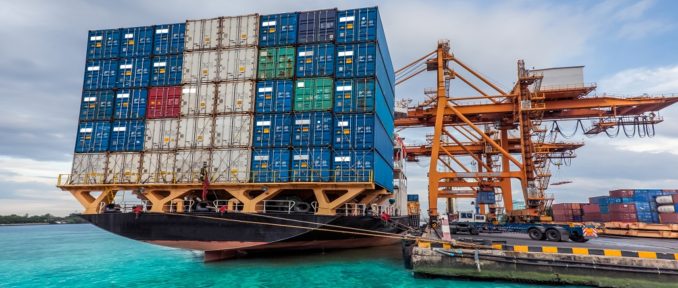Nigerian importers to lose N33.6bn on SON’s return to seaports
March 25, 2020621 views0 comments
By Samson Echenim
Importers in Nigeria face no less than N33.6 billion loss in port storage charge if the Standards Organisation of Nigeria (SON) or any more agency of the federal government is allowed to return to seaports in the country.
Read Also:
Findings by business a.m revealed that with one or two more agencies having permanent presence at the ports, cargo dwell time will increase by no less than two days.
With average port storage cost per TEU at N12,000 according to Safmarine, computations by business a.m showed that two more days delay on Nigeria’s average 1.4 million containers importations per year would amount to N33.6 billion. This is the amount that importers would part with to terminal operators annually for having their containers delayed for additional two days as they wait for SON inspection. According to CEIC data, Nigeria’s container importations averaged 1,400,000 TEU from December 2008 to 2018.
SON recently, activated deliberate action plans which involved lobbying of the House of Representatives and some associations of Customs brokers and freight forwarders to return to the seaport. It claimed that not maintaining a permanent presence at the ports was hampering its ability to monitor and check influx of imported sub standard products into the country.
SON is one of the eight agencies of the federal government of Nigeria sacked from the seaports by the then minister of finance and coordinating minister of the economy in August 2011, following complaints of multiple charges, red tapism and delay in cargo delivery processes at the country’s seaports.
The affected agencies, which also includes NAFDAC and NDLEA were directed to leave the port environment and to only come into the port on invitation by the Nigeria Customs Service to inspect suspected importations. The step was necessary to eliminate delay in the import clearing process and reduce cargo dwell time, the government had said.
We don’t want more agencies at the port —NPA, port owners
Meanwhile, responses from both the Nigerian Ports Authority (NPA), ports landlord and port terminal operators indicate that more agencies of government having permanent presence at the port would further geopardise the situation at the ports, especially ports in Lagos which are currently experiencing congestion.
The NPA told business a.m that a return of the Standards Organisation of Nigeria (SON) or any other government agency would cause longer delay and elongate cargo dwell time currently at 21 days. This, the port landlord noted, would hinder the ease of doing business initiative of the Nigerian government at the ports.
However, while submitting that it does not have the powers to determine which agencies of government should have a permanent base at the seaports, the NPA said moves by some government agencies to return to the port was not necessary as the Customs always invite relevant agencies to inspect importations suspected to have shortcomings.
“We have no control over which agencies of government should be at the ports, because it is the prerogative of the federal government. When we had lots of issues with delay of cargo at the ports in 2011, we wrote to the federal government to do what it could to ensure that the delay was eliminated. The minister came and slashed the number of the agencies to be at the port and directed some agencies to leave the port. So, having the agencies back at the ports will be counter productive. It will definitely hinder the ease of doing business policy of the federal government, “ said Adams Jatto, general manager, Corporate and Strategic Communications, NPA.
He noted that lobbying the House of Representatives by agencies to help them return to the port would not work, clarifying that only the federal government has the prerogative to return any agency to the seaports.
“I read in some papers that the House of Representatives are saying they will return the agencies to the ports. Not even the lawmakers can return the organisation to the port. It is only the federal government that can do that, but again, I am afraid that bringing the SON or any more agency of government back to the ports will impede the ease of doing business initiative that we have in the port,” Jatto noted.
Agents, freight forwarders double standards
Curiously, Nigeria’s largest associations of freight forwarders and customs agents, the National Association of Government Approved Freight Forwarders (NAGAFF) and the Association of Nigerian Licensed Customs Agents (ANLCA) are supporting SON’s quest to return to the seaports, despite the fact that outcry by members of the two associations led to the pruning of government agencies at the ports in 2011.
Boniface Aniebonam, founder of NAGAFF said, “We are calling on the Federal Government to ensure that SON returns to the port; as we are aware of the harm substandard goods cause to the economy and safety of the people. Our stand is that SON should be dominant in the port, while other agencies like NAFDAC should be called upon whenever their services are needed.”
Stanley Ezenga, the association’s spokesman said, “The position of NAGAFF is that Standard Organisation of Nigeria, being the agency saddled with the responsibility of ensuring standardisation of goods in Nigeria market through SONCAP and MANCAP, should not be far from entry point of these products. Nigerians have complained about the influx of fake and substandard products into the market of which SON have always posited that their not domiciled inside the port as their reason for this situation. Even though they have been integrated into NICIS 11 platform, from where they have overview of all import declaration and indicate interest in any that fall under their purview. It is in our opinion that they should be given an enabling environment to perform their statutory duties effectively, so we can judge their performance afterwards.”

